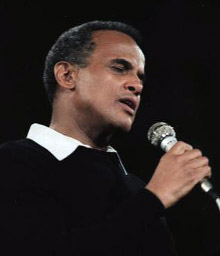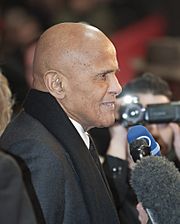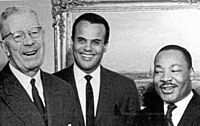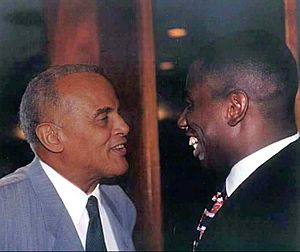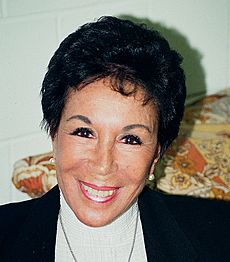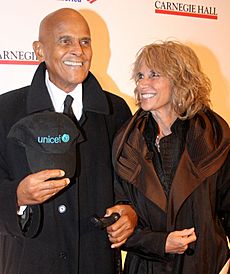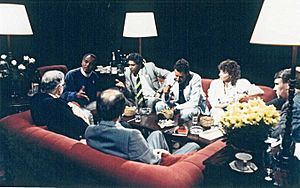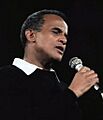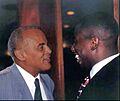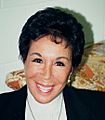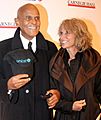Harry Belafonte facts for kids
Quick facts for kids
Harry Belafonte
|
|
|---|---|
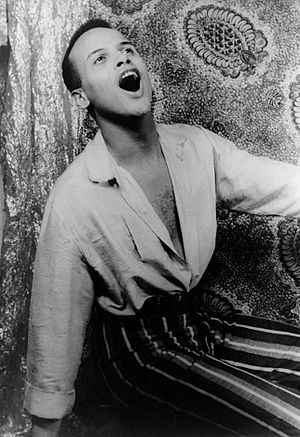
Belafonte in 1954
|
|
| Born |
Harold George Bellanfanti Jr.
March 1, 1927 New York City, U.S.
|
| Died | April 25, 2023 (aged 96) New York City, U.S.
|
| Other names |
|
| Occupation |
|
| Years active | 1949–2023 |
|
Works
|
Discography |
| Political party | Democratic |
| Spouse(s) |
Marguerite Byrd
(m. 1948; div. 1957)Julie Robinson
(m. 1957; div. 2004)Pamela Frank
(m. 2008) |
| Children | 4, including Shari |
| Musical career | |
| Genres | |
| Instruments | Vocals |
Harry Belafonte (born Harold George Bellanfanti Jr.; March 1, 1927 – April 25, 2023) was a famous American singer, actor, and activist. He helped make calypso music popular around the world in the 1950s.
Belafonte was one of the few performers to win an EGOT. This means he won an Emmy, a Grammy, an Oscar, and a Tony Award! His big break came with his album Calypso (1956). It was the first LP (a type of record album) by a single artist to sell over a million copies.
He was best known for his songs like "Day-O (The Banana Boat Song)", "Jump in the Line (Shake, Senora)", and "Jamaica Farewell". Harry Belafonte sang in many styles, including blues, folk, and gospel. He also starred in movies such as Carmen Jones (1954) and BlacKkKlansman (2018).
Belafonte was a close friend of Martin Luther King Jr. and an important voice during the Civil Rights Movement. He also spoke out against certain government policies and was a UNICEF ambassador.
Contents
Early Life and Acting Beginnings
Harry Belafonte was born Harold George Bellanfanti Jr. on March 1, 1927, in Harlem, New York City. His parents were from Jamaica. His father was a chef, and his mother was a housekeeper.
From 1932 to 1940, Harry lived in Jamaica with his grandmother. He went to school there. When he returned to New York City, he attended George Washington High School. Later, he joined the U.S. Navy and served during World War II.
In the 1940s, while working as a janitor's helper, he received free tickets to the American Negro Theater. He loved acting and became friends with Sidney Poitier. They were both struggling financially. They would often buy one ticket to a play and take turns watching different acts.
Belafonte later took acting classes at The New School in New York. Famous actors like Marlon Brando and Tony Curtis were also there. He won a Tony Award for his role in the Broadway show John Murray Anderson's Almanac (1954).
Musical Journey
Starting His Music Career (1949–1955)
Harry Belafonte began singing in clubs in New York to help pay for his acting lessons. His first time performing, he was backed by the famous Charlie Parker band, which included Miles Davis.
He started recording pop songs in 1949. But he soon became very interested in folk music. He learned many songs from the Library of Congress' folk song archives. In 1953, he signed with RCA Victor. His first popular song was "Matilda", which he recorded in 1953. This song became a favorite for audience participation at his concerts.
Becoming a Star (1956–1958)
Belafonte's album Calypso (1956) was a huge success. It was the first LP in the world to sell over 1 million copies in one year. The album stayed at number one on the Billboard charts for 31 weeks!
Calypso introduced American audiences to calypso music, which came from Trinidad and Tobago. Because of this, Belafonte was called the "King of Calypso." However, he was humble about this title.
One of the most famous songs from the album is "Banana Boat Song" (also known as "Day-O"). It reached number five on the pop charts. Another popular song from the album was "Jamaica Farewell".
Mid-Career Success (1959–1970)
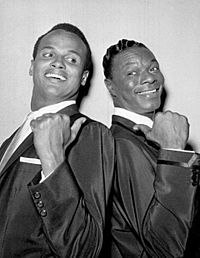
Even though he was known for Calypso, Belafonte recorded many different kinds of music. His next big hit after "The Banana Boat Song" was the funny song "Mama Look at Bubu".
In 1959, Belafonte starred in Tonight With Belafonte, a TV special. He won an Emmy Award for this show, becoming the first Jamaican American to do so. He also released two successful live albums recorded at Carnegie Hall. From his 1959 album, "Hava Nagila" became one of his signature songs.
In 1961, he performed at President John F. Kennedy's inauguration. Later that year, his album Jump Up Calypso also sold over a million copies. During the 1960s, he helped introduce American audiences to international artists like South African singer Miriam Makeba and Greek singer Nana Mouskouri. A young Bob Dylan even played harmonica on Belafonte's 1962 album Midnight Special.
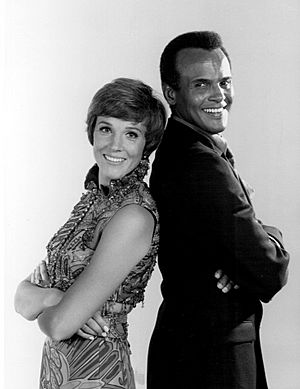
As new music styles became popular, Belafonte's songs appeared less often on the charts. However, he won Grammy Awards for his albums Swing Dat Hammer (1960) and An Evening with Belafonte/Makeba (1965). The latter album spoke out against apartheid in South Africa. He also earned six Gold Records for selling many albums.
In the 1960s, Belafonte appeared on TV specials with stars like Julie Andrews and Lena Horne. In 1968, he even guest-hosted The Tonight Show for a week, interviewing important guests like Martin Luther King Jr. and Senator Robert F. Kennedy.
Later Music and Activities (1971–2023)
Belafonte released his last calypso album, Calypso Carnival, in 1971. After 1974, he recorded less often and spent more time touring the world. In 1977, he released Turn the World Around, an album focused on world music.
In 1978, he was a guest on The Muppet Show. He performed "Day-O" and a spiritual song called "Turn the World Around" with special Muppets. This performance was very famous and was reportedly Jim Henson's favorite.
In 1988, Belafonte released Paradise in Gazankulu, his last studio album. It featured ten protest songs against the former Apartheid policy in South Africa. That same year, as a UNICEF Goodwill Ambassador, he performed a concert in Zimbabwe to help children in Southern Africa.
In 2001, a large music project he recorded in the 1960s and 1970s, The Long Road to Freedom: An Anthology of Black Music, was finally released. It was nominated for three Grammy Awards.
Belafonte received the Kennedy Center Honors in 1989 and the National Medal of Arts in 1994. He also won a Grammy Lifetime Achievement Award in 2000. He continued to perform sold-out concerts until 2003. In 2007, he announced his retirement from performing.
In 2014, he received an honorary doctorate from Berklee College of Music. In 2017, he released When Colors Come Together, which included his grandchildren singing.
Film Career
Early Film Roles (1953–1956)
Harry Belafonte starred in many films. His first movie was Bright Road (1953). He then starred with Dorothy Dandridge in the musical Carmen Jones (1954). Interestingly, their singing voices in the film were provided by opera singers.
Rising as an Actor (1957–1959)
Belafonte appeared in Island in the Sun in 1957. In 1959, he starred in and produced Odds Against Tomorrow through his own company. He also co-starred in The World, the Flesh and the Devil. He turned down a role in Porgy and Bess because he felt it showed racial stereotypes. Sidney Poitier took the role instead.
Later Films (1960–2018)
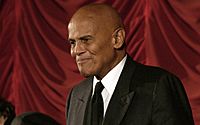
Belafonte focused more on music in the 1960s because he wasn't happy with the film roles he was offered. In the early 1970s, he appeared in more movies, including two with Sidney Poitier: Buck and the Preacher (1972) and Uptown Saturday Night (1974).
In 1984, Belafonte produced the musical film Beat Street, which was about the rise of hip-hop culture. He also helped produce its gold-certified soundtrack.
He later starred in White Man's Burden (1995) and Robert Altman's Kansas City (1996). For Kansas City, he won an award for Best Supporting Actor. His last film role was in Spike Lee's Oscar-winning movie BlacKkKlansman (2018), where he played an elderly civil rights pioneer.
Activism and Humanitarian Work
Harry Belafonte believed that art and politics could work together. His political views were greatly influenced by Paul Robeson, a singer, actor, and civil rights activist who became his mentor. Robeson spoke out against racism in the U.S. and against colonialism in Africa. Belafonte refused to perform in the American South from 1954 to 1961 because of segregation.
In 1960, Belafonte supported John F. Kennedy's presidential campaign. Kennedy later made Belafonte a cultural advisor for the Peace Corps.
Helping the Civil Rights Movement
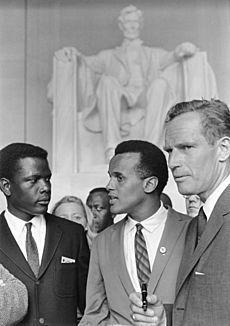
Belafonte was a strong supporter of the Civil Rights Movement in the 1950s and 1960s. He was a close friend and trusted advisor to Martin Luther King Jr.. He even helped support King's family financially.
During the Birmingham Campaign in 1963, Belafonte paid King's bail when he was arrested. He also raised $50,000 to help other civil rights protesters get out of jail. He supported the Freedom Riders in 1961 and helped organize the famous 1963 March on Washington.
Belafonte said that Paul Robeson gave him his "backbone" and Martin Luther King Jr. "nourished his soul." Throughout his life, Belafonte championed political and humanitarian causes, including the Anti-Apartheid Movement and USA for Africa. From 1987 until his death, he was a UNICEF Goodwill Ambassador.
In 1964, during the "Mississippi Freedom Summer", Belafonte helped fund the Student Nonviolent Coordinating Committee. He flew to Mississippi with Sidney Poitier, carrying $60,000 in cash, and performed for crowds.
Humanitarian Efforts
In 1985, Belafonte helped organize the famous song "We Are the World". This song brought together many artists to raise money for Africa. He also performed at the Live Aid concert that same year.
As a UNICEF goodwill ambassador, Belafonte traveled to Senegal in 1987. He led a meeting of artists and thinkers to focus on the needs of African children. He also helped raise money at a huge concert in Africa. In 1994, he went to Rwanda to raise awareness about the needs of children there.
In 2001, Belafonte visited South Africa to support the fight against HIV/AIDS. In 2004, he went to Kenya to highlight the importance of educating children.
Belafonte was also involved in prostate cancer awareness after being successfully treated for the disease in 1996. He received the BET Humanitarian Award in 2006. In 2007, he helped raise a record amount of money for UNICEF on Norwegian television.
Political Views
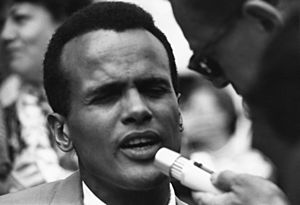
Belafonte often spoke out about U.S. foreign policy. He criticized the U.S. embargo on Cuba and praised Soviet peace efforts. He also spoke against the U.S. invasion of Grenada.
He was very active in the Anti-Apartheid Movement against racial segregation in South Africa. He was a board member of important organizations like the TransAfrica Forum.
Belafonte gained a lot of attention in 2002 for his comments about President George W. Bush and the Iraq War. He was awarded the Domestic Human Rights Award in 2004.
He supported Barack Obama's father in the 1950s, helping him get a scholarship to study in Hawaii. In 2016, Belafonte supported Bernie Sanders for president, saying Sanders represented "truth" and "opportunity."
He was also an honorary co-chair of the Women's March on Washington in 2017.
Personal Life and Passing
Harry Belafonte was married three times. His first marriage was to Marguerite Byrd from 1948 to 1957. They had two daughters, Adrienne and Shari Belafonte.
In 1957, he married Julie Robinson, a dancer. They were married for 47 years and had three children. They divorced in 2004. In 2008, he married Pamela Frank.
Belafonte had five grandchildren. He passed away from congestive heart failure at his home in New York City on April 25, 2023, at the age of 96.
Discography
Belafonte released 30 studio albums and eight live albums during his career.
Filmography
Film Roles
| Year | Title | Role | Notes | |
|---|---|---|---|---|
| 1953 | Bright Road | Mr. Williams | ||
| 1954 | Carmen Jones | Joe | ||
| 1957 | Island in the Sun | David Boyeur | ||
| The Heart of Show Business | Short | |||
| 1959 | The World, the Flesh and the Devil | Ralph Burton | ||
| Odds Against Tomorrow | Ingram | |||
| 1970 | The Angel Levine | Alexander Levine | ||
| 1972 | Buck and the Preacher | Preacher | ||
| 1974 | Uptown Saturday Night | Dan "Geechie Dan" Beauford | ||
| 1983 | Drei Lieder | Short | ||
| 1992 | The Player | Cameo | ||
| 1994 | Ready to Wear | Cameo | ||
| 1995 | White Man's Burden | Thaddeus Thomas | ||
| 2006 | Kansas City | Seldom Seen | ||
| 2006 | Bobby | Nelson | ||
| 2018 | BlacKkKlansman | Jerome Turner | Final film role |
- Documentaries
| Year | Title | |
|---|---|---|
| 1970 | King: A Filmed Record... Montgomery to Memphis | |
| 1981 | Fundi: The Story of Ella Baker | |
| 1982 | A veces miro mi vida | |
| 1983 | Sag nein | |
| 1984 | Der Schönste Traum | |
| 1989 | We Shall Overcome | |
| 1995 | Hank Aaron: Chasing the Dream | |
| 1996 | Jazz '34 | |
| 1998 | Scandalize My Name: Stories from the Blacklist | |
| 2001 | Fidel | |
| 2003 | XXI Century | |
| Conakry Kas | ||
| 2004 | Ladders | |
| 2010 | Motherland | |
| 2011 | Sing Your Song | |
| 2013 | Hava Nagila: The Movie | |
| 2020 | The Sit-In: Harry Belafonte hosts the Tonight Show |
Television Appearances
- Sugar Hill Times (1949–1950)
- The Ed Sullivan Show (1953–1964)
- The Nat King Cole Show (1957)
- The Steve Allen Show (1958)
- Tonight With Belafonte (1959)
- Round Table on March on Washington (1963)
- The Danny Kaye Show (1965)
- Petula (1968)
- The Smothers Brothers Comedy Hour (1968)
- The Tonight Show (1968)
- A World in Music (1969)
- Harry & Lena, For The Love Of Life (1969)
- A World in Love (1970)
- The Flip Wilson Show (1973)
- Free to Be ... You and Me (1974)
- The Muppet Show (1978)
- Grambling's White Tiger (1981)
- Don't Stop The Carnival (1985)
- After Dark (1988)
- An Evening with Harry Belafonte and Friends (1997)
- Swing Vote (1999)
- Swing Vote (1999 TV movie)
- PB&J Otter "The Ice Moose" (1999)
- Tanner on Tanner (2004)
- That's What I'm Talking About (2006) (miniseries)
- When the Levees Broke: A Requiem in Four Acts (2006) (miniseries)
- Speakeasy, interviewing Carlos Santana (2015)
Concert Videos
- En Gränslös Kväll På Operan (1966)
- Don't Stop The Carnival (1985)
- Global Carnival (1988)
- An Evening with Harry Belafonte and Friends (1997)
Theatre Work
- John Murray Anderson's Almanac (1953)
- 3 for Tonight (1955)
- Moonbirds (1959) (producer)
- Belafonte at the Palace (1959)
- Asinamali! (1987) (producer)
Awards and Honors
Harry Belafonte was an EGOT honoree. This means he won a Grammy, an Emmy, a Tony, and an Oscar (though his Oscar was a special humanitarian award).
He also received many other honors, including the Kennedy Center Honors in 1989 and the National Medal of Arts in 1994. In 2022, he was inducted into the Rock and Roll Hall of Fame.
In 2020, Belafonte celebrated his 93rd birthday at the Apollo Theater in Harlem. The New York Public Library's Schomburg Center for Research in Black Culture acquired his large collection of photos, recordings, letters, and other items.
Images for kids
-
Belafonte with Nat King Cole in 1957
-
With Julie Andrews on the NBC special An Evening with Julie Andrews and Harry Belafonte (1969)
-
Belafonte at the 2011 Viennale
-
Belafonte with King Gustav VI Adolf and Martin Luther King Jr. in 1964
-
Belafonte (center) at the 1963 Civil Rights March on Washington, D.C with Sidney Poitier (left) and Charlton Heston
-
Belafonte speaking at the 1963 Civil Rights March on Washington, D.C
See also
 In Spanish: Harry Belafonte para niños
In Spanish: Harry Belafonte para niños
 | Toni Morrison |
 | Barack Obama |
 | Martin Luther King Jr. |
 | Ralph Bunche |


